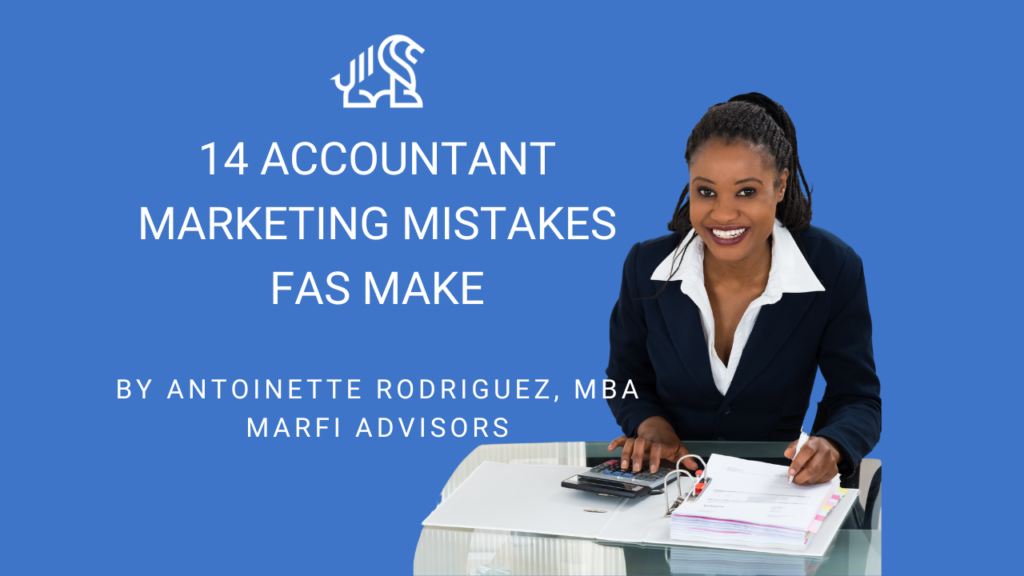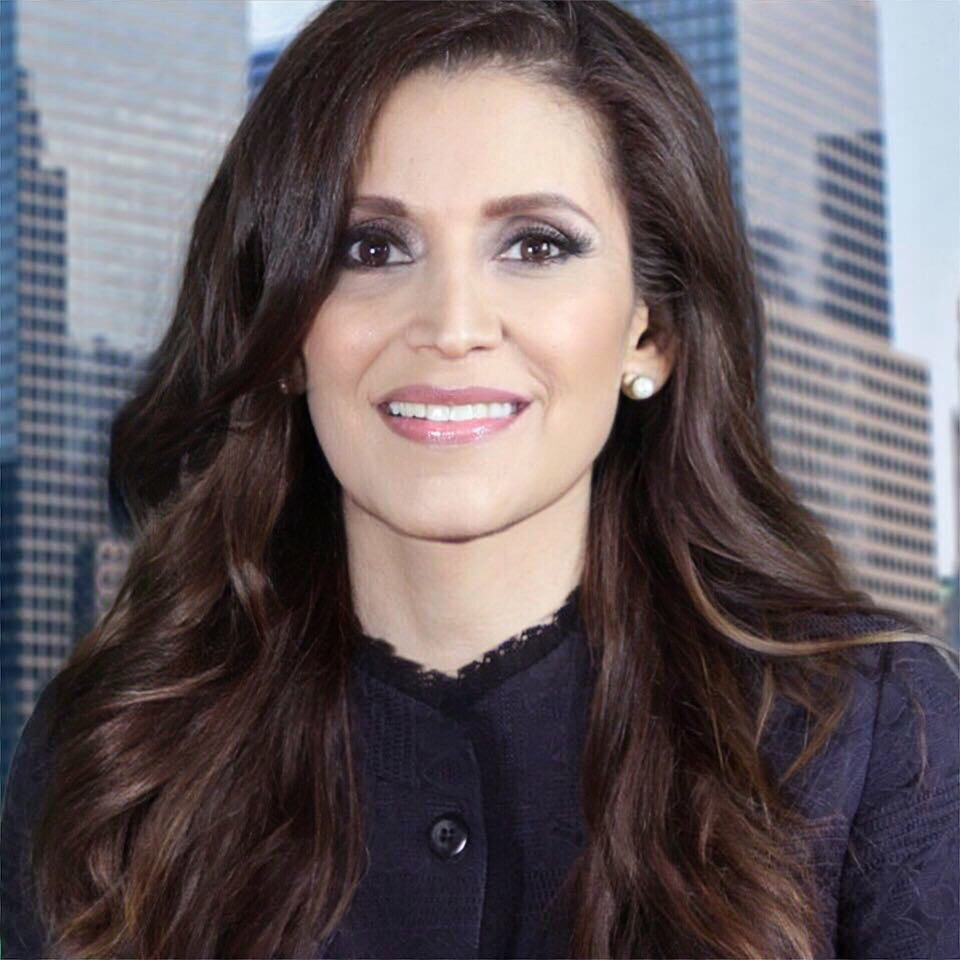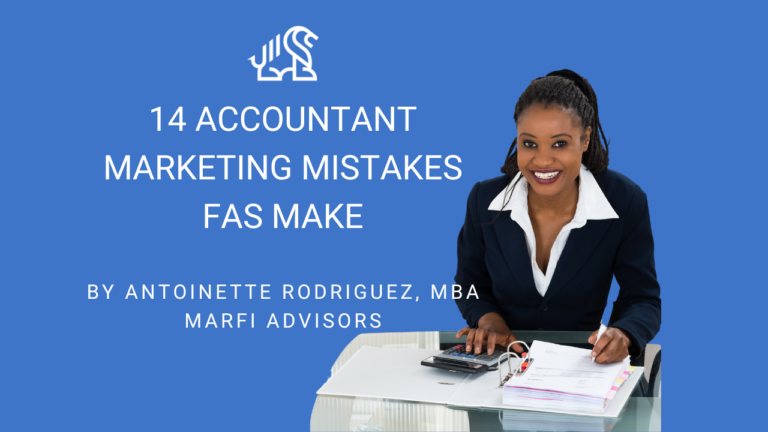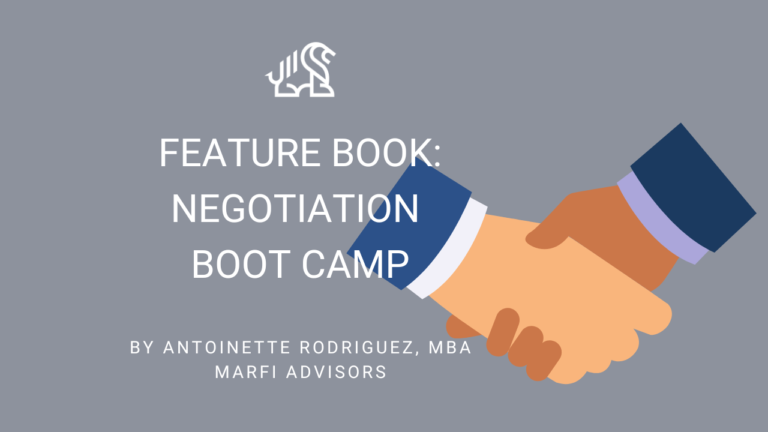Description
There are many reasons that a financial advisor would want to do business with and get referrals from accountants. The pre-qualification of prospects, the years of goodwill that emanate from trust, and the knowledge of money-in-motion events. There are many mistakes FAs, especially junior ones, make in relation to marketing to accountants. Watch the video to learn more.
AI-Generated Transcript
14 Accountant Marketing Mistakes FAs Make
[00:00:04] Antoinette Rodriguez: 14 mistakes financial advisors make when prospecting to accountants. There are many reasons that a financial advisor would want to do business with and get referrals from accountants. The pre-qualification of prospects, the years of goodwill that emanate from trust, the knowledge of money-in-motion events. And of course, that as complementary financial professionals, they may know how to position your FA services.
[00:00:36] Antoinette Rodriguez: There are mistakes that financial advisors, especially junior ones make in relation to marketing to accountants. Here are 14
[00:00:45] Antoinette Rodriguez: Not understanding that accountants have fiduciary responsibilities to their clients. They take this responsibility very seriously and worry about their [00:01:00] client’s best interests when they refer them out to FAs. It’s a reason why accountants take their time when determining which financial advisors to deal with.
[00:01:15] Antoinette Rodriguez: #2. Giving up too early. If the average sale is made in over 12 contacts, the average sale to accountants is likely a much longer timeframe. Financial advisors, especially novice ones, notoriously give up too early.
[00:01:38] Antoinette Rodriguez: #3. Not realizing that accountants want to be seen as business advisors. In their quest to provide more services to their clients for retention and profit purposes, accountants may want to provide financial planning in-house. In fact, almost half of all accounting practices provide some form of financial [00:02:00] planning. Do your homework to find out which ones they are.
#8[00:02:08] Antoinette Rodriguez: #4. Not knowing how much they fear you blowing up their clients. Accountants are naturally risk-averse. One of their biggest concerns is that you will blow up their clients’ portfolios and it will reflect poorly on them. And certainly news stories of how rogue FAs rip off clients does not help allay those fears.
[00:02:32] Antoinette Rodriguez: #5. Pushing revenue sharing arrangements. Money is not generally the top motivator for accountants. They may look skeptically on fee-sharing arrangements because of the perception that receiving commissions is at odds with their fiduciary responsibilities or the perception of conflict of interest.
[00:02:58] Antoinette Rodriguez: #6. [00:03:00] Not including the accountant in decision-making. Accountants naturally don’t want to lose their clients. Many FAs, in their quest to be the quarterback of the clients’ financial lives, forget to include the referring accountant in decision-making. Clearly, this is not a good way to gain future referrals.
[00:03:24] Antoinette Rodriguez: #7 Forgetting that accountants are naturally cautious people by virtue of their detail orientation. They may take longer to make decisions and possibly need more data. If you are a pushy alpha personality, this can turn off the accountant. Lesson? Take your time.
[00:03:50] Antoinette Rodriguez: #8 Contradicting the accountant. As they are naturally detail-oriented and consider themselves precise people, accountants do not like to be wrong. [00:04:00] They might take it personally. When you contradict their advice and may even go out of their way to prove you wrong. Try to get on the same side of the accountant and don’t undermine him or her.
[00:04:18] Antoinette Rodriguez: #9 Inappropriate timing. Should it really be necessary to tell financial advisors to not contact accountants during tax season? Come on people.
[00:04:31] Antoinette Rodriguez: #10 Focusing on investments only. Like you should be, the accountant is focusing on their clients’ entire financial lives. If they perceive that a financial advisor is only focused on the fee-generating investments part, that will be a turn off.
[00:04:51] Antoinette Rodriguez: #11 Target Market Mismatch – Assuming that the accountant’s target market matches yours. Many accountants have a diversity of clients in their book. [00:05:00]They don’t necessarily have all high-net-worth clients or business owners. They may not even have clients that have money-in-motion events. Make sure that you do thorough and honest due diligence before investing a lot of time in setting up a relationship with an accountant who does not have a similar target market as of yours. Of course, one ultra high-net-worth client per year could very well be worth the price of maintaining the accounting relationship. So consider that possibility as well.
[00:05:35] Antoinette Rodriguez: #12 Assuming the accountant is only going to deal with you. Accountants, like wealthy clients, do business with a lot of other financial Advisors. It could be that the financial advisor sent them business at one time. Or that they simply respect and trust the other financial advisors. Don’t expect to get all the accountant’s business, especially in the beginning of the relationship.[00:06:00]
[00:06:03] Antoinette Rodriguez: #13 Thinking that you are God’s gift to the accountant. Nothing turns off the accountant faster than when a financial advisor acts like they’re a gift from God to either themselves or the clients. A few simple rules here. Don’t be arrogant. Don’t act like a know-it-all. And be a team player.
[00:06:29] Antoinette Rodriguez: #14 Assuming that the accountant is a salesperson. Due to their cautious and detailed nature, accountants may not necessarily have strong sales skills. Consequently, they may not know how to position your product or service. The best solution is to educate them, provide materials to help their clients, and don’t expect them to close your business.
[00:06:54] Antoinette Rodriguez: Ideally, you should rely on them for lead generation and pre-qualification of [00:07:00] prospects.








